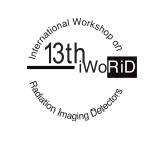Speaker
Mr
Jun Hyung Bae
(KAIST)
Description
In this study, we designed and fabricated active pixel sensors with various photodiode structures using 0.18 μm 1Poly/4Metal CMOS process. All photodiodes have 50 μm pitch for X-ray imaging and the same pixel structure, 3-transistor active pixel. First of all, we considered three basic photodiode structures, n-well/p-epi, n+/p-epi and p+/n-well/p-epi, available in the standard CMOS process. A trade-off between sensitivity and dark current for the specific wavelength emitted from the CsI(Tl) scintillator was measured. Moreover, we investigated the effect of shallow trench isolation (STI) on dark current. Since the used process provides flexibility to design the photodiode, we could utilize STI blocked n+ and n-well regions and easily control the distance between photodiode junctions and STI regions. Finally, the dependence of dark current on the photodiode shape as well as the number of contacts is examined. In order to obtain precise and analytical results, the test pixels were connected to off-chip 16-bit analog-to-digital converters (ADCs) and the data processing was performed through the graphic user interface (GUI) program using Labview and Matlab.
Author
Mr
Jun Hyung Bae
(KAIST)
Co-authors
Mr
Bo Kyung Cha
(KERI)
Mr
Dae Hee Lee
(KAIST)
Mr
Dong-uk Kang
(KAIST)
Prof.
Gyuseong Cho
(KAIST)
Mr
Hyoungtaek Kim
(KAIST)
Mr
Hyunjun Yoo
(KAIST)
Mr
Min Sik Cho
(KAIST)
Mr
Myung Soo Kim
(KAIST)
